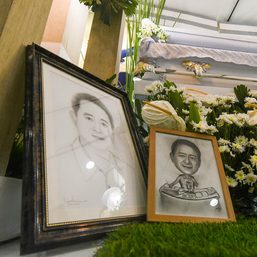SUMMARY
This is AI generated summarization, which may have errors. For context, always refer to the full article.
In a rebuke of the Supreme Court’s decision on prisoners’ plea for release during the pandemic, experts said the High Court must “get real” and see prison conditions in the Philippines for what it is – dire, and in need of judicial intervention.
“Ang Supreme Court natin, kailangan natin ipursigi siya, i-challenge natin siya hanggang makita niya ang sitwasyon sa field. ‘Yun ang problema, hindi nakikita nakikita ng Supreme Court ‘yung realidad sa baba,” prison reform expert Raymund Narag said at a webinar hosted by the Institute for the Administration of Justice of the University of the Philippines (UP) College of Law on Thursday, November 5.
(We should persevere in challenging our Supreme Court to see what the situation is in the field. That’s the problem, the Supreme Court does not see the realities on the ground.)
The webinar was about the Supreme Court’s recent decision on a holistic petition of 22 political prisoners for humanitarian bail amid the pandemic, which was to remand it to lower courts for proper bail hearings.
The decision, which took 5 months to be publicized, was slammed for being too late as a baby of one of the petitioners was born and later died as justices debated the issue.
“The Supreme Court’s response was something that might be called business as usual. In the dispositive portion of the case, it says ‘wherefore the Court treats the present petition as applications for bail and recognizance;’ and that to me is a little disturbing because it smacks of indifference,” said UP constitutional law professor Dan Gatmaytan.
“I don’t understand what part of urgent or humanitarian or pandemic the Supreme Court doesn’t understand,” said Gatmaytan.
Progressive groups have squarely put the blame on Philippine courts for the death of baby River Nasino, saying they failed to respond to the peculiar situation of the baby’s mother, pregnant at the time she filed the petition for what they described as trumped up charges.
Criminal law expert Ted Te, former spokesperson of the Supreme Court, said the justices “could have, would have, should have, but didn’t,” saying the 301-page decision is now only good for academic discussion.
“Sometimes the courts must get real; the decision was in a different universe, it’s as if you were reading a decision in a separate world, in an alternate world, in a different timeline where COVID did not exist,” Te said.
Prison conditions
Highlighting the problematic and slow-paced criminal justice in the country, Narag said that in one jail here, a prisoner has spent 16 years on trial.
“Meron tayong mga inmates na nagtatagal ng 16 years, 9 months sa loob, ongoing trial lahat ito, hindi pa ito convicted, may 9 years, 7 years, 5 years,” said Narag, who was a detainee himself before being acquitted, and who has spent his professional career exhaustively studying Philippine jails. He teaches at the Southern Illinois University’s Department of Criminology and Criminal Justice.
(We have inmates who spend 16 years and 9 months inside, ongoing trial, without a conviction, some spend 9 years, 7 years, 5 years.)
Narag said that data obtained from jails would show some prisoners on trial have not had a hearing in two years and 5 months. “Ganun katagal ang takbo ng kaso sa Pilipinas (that’s how slow-paced the system is),” said Narag.
The Supreme Court decision discussed at length the difficulty of striking a balance between state interest and upholding prisoners’ rights.
But for lawyer Rommel Alim Abitria, executive director of Humanitarian Legal Assistance Foundation (HLAF), there was no balance to speak of because the system in itself is already scaled against prisoners.
Communities, Abitria said, are not even equipped to welcome prisoners back to free society.
“Is it better for the baby to be separated from the mother PDL [person deprived of liberty]? Was it better? Was it for the best interest of the child in the time of the pandemic? Or is it just better for PDLs to be inside the jails so they will not do harm to society? The answer would always be in favor of warehousing the PDL in jail,” Abitria said. (PODCAST: Law of Duterte Land: Philippine courts and the death of baby River)
‘They threw away the opportunity’
The petition invoked the controversial precedent of granting bail to plunder defendant and former senator Juan Ponce Enrile, but that argument failed as dissenters to that decision refused to concede that the Enrile bail was proper.
The 301-page decision and separate opinions would reflect the exhaustive debates the petition went through, and according to Te, highlighted the lack of consensus. (READ: On baby River’s death: ‘Hindi kami nagpabaya,’ Chief Justice Peralta says)
The justices’ separate opinions cited the Supreme Court’s efforts amid the pandemic, like reduced bail and reiterating rules on recognizance, but Abitria said those existing rules are already “cumbersome” in normal circumstances, even more in a pandemic where hearings are postponed.
For Abitria, the Supreme Court “threw away the opportunity” to come up with a clear guideline on how to treat requests for bail on humanitarian grounds.
“The decision did not even make a dent in the legal system insofar as protection of the rights of the PDLs is concerned,” said Abitria.
“Lower courts will not have a standard on using humanitarian considerations as a valid ground for release. Without the guideline, judges would play safe like the Supreme Court did. What does that mean? That means Enrile is still released, and other PDLs will not be released,” added Abitria.
The proposal of Associate Justice Marvic Leonen to promulgate rules on an extraordinary writ of Kalayaan to respond to prisoners’ welfare remains a suggestion, according to Chief Justice Diosdado Peralta. – Rappler.com
Add a comment
How does this make you feel?


![[WATCH] Silent Tragedy: Epekto ng war on drugs sa mga bilangguan](https://www.rappler.com/tachyon/2024/06/silent-tragedy-tcard.jpg?resize=257%2C257&crop_strategy=attention)


There are no comments yet. Add your comment to start the conversation.